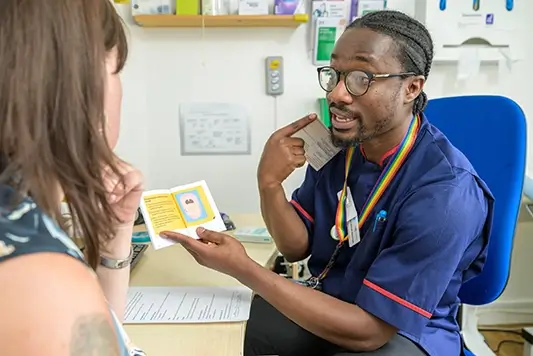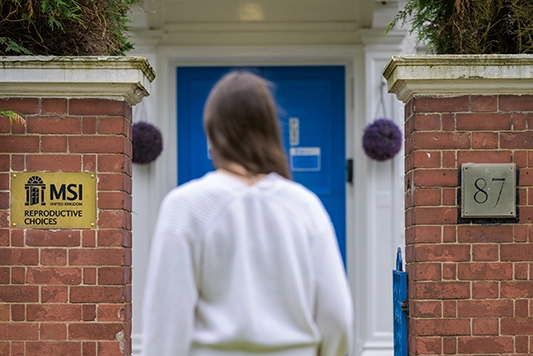Diana Johnson MP has tabled an amendment to the Criminal Justice Bill which would stop anyone facing prosecution for ending their own pregnancy in England and Wales. MPs will soon have the opportunity to vote on this amendment in the House of Commons. If you’d like your MP to vote for this important milestone in UK abortion rights, write and let them know.
You can use our ‘Write to Your MP’ tool here with a template letter for you to adapt.
We strongly recommend that you personalise the wording as your letter will carry the most weight if it is original and in your own words. We hope our template letter is a useful guide.
Why is MSI Reproductive Choices UK backing this amendment?
In recent years, there has been a worrying rise in the number of women investigated because they had experienced unexplained pregnancy loss and were suspected of having an abortion outside the law. Six women have appeared in court in the last 18 months. In one instance, a woman was sent to jail before being released on appeal. Before that, in the time since the Abortion Act 1967 was passed over half a century ago, only three women have been convicted of having an abortion outside the law.
Why are there more investigations into a suspected unlawful abortion or unexplained pregnancy loss?
There are multiple reasons behind the apparent rise in investigations. There is no evidence that more people are ending their pregnancies outside the law. However, in recent years there has been greater awareness that abortion can be completed with pills (as opposed to a surgical procedure) and that it can be completed at home. In the past, an unexplained pregnancy loss would have been treated with compassion, not met with suspicion. The rise in investigations reflects a culture in which unexplained pregnancy loss is, unfortunately, not always well understood by the police or, in some cases, the healthcare workforce.
(The Royal College of Obstetricians and Gynaecologists (RCOG) recently published guidance to remind healthcare workers of the protocols around responding to an unexplained pregnancy loss. You can read the guidance here.)
There are many circumstances which can lead to people finding themselves facing an investigation in relation to an unexplained pregnancy loss. But regardless of the reason, we don’t believe it is ever in the public interest for anyone to go to prison for ending their own pregnancy.
Isn’t abortion legal in Britain?
There are around 200,000 abortion procedures carried out each year in England and Wales alone. The vast majority of these are delivered by regulated providers like MSI Reproductive Choices UK and are funded by the NHS.
Yet abortion has not been decriminalised in Britain. The Abortion Act 1967 established a set of conditions which, when met, make an abortion lawful. However, if these conditions are not met (for example, if two doctors have not signed the appropriate paperwork) their abortion is illegal under the Offences Against the Persons Act 1861 and the Infant Life Preservation Act 1929.
It is indefensible that our reproductive rights in 2024 are still governed by a Victorian law, passed before women even had the vote.
Not only has gender equality changed since 1861 but medical care itself is also very different. Today, abortion is a routine healthcare procedure and can even be undertaken in the privacy and comfort of the home, thanks to carefully regulated telemedicine services.
Abortion is healthcare and should be regulated by medical best practice and clinical evidence, not criminalised based on laws from two centuries ago.
What would Diana Johnson’s amendment do?
If passed into law, Diana Johnson’s amendment to the Criminal Justice Bill would mean that the relevant sections of the above laws no longer apply to those who are ending their own pregnancies, while leaving every other aspect of abortion law and regulation untouched.
Abortion care is one of the most heavily regulated areas of healthcare, despite being one of the most common and safe. If the amendment is passed, this will not change.
The only change would be that no-one would face criminal investigation for ending their own pregnancy.
If MPs vote in favour of the amendment, it will become part of the Criminal Justice Bill and progress to the House of Lords. At this stage, we will continue our advocacy to win support from Peers. The legislation will have to complete the full passage through Parliament before it is signed into law. The upcoming House of Commons vote is the first step and a crucial one. You can read more about the steps involved here.
Who would be protected by this law?
It is extremely unusual for anyone to end their pregnancy outside the law, but on the rare occasions when it does happen, it is distressing for everyone involved. It is never a simple situation, and the stories we hear about have involved women making incredibly difficult decisions in sometimes deeply traumatic circumstances.
Women who have faced investigation include domestic abuse survivors and suspected trafficking victims. There are also women who have been investigated following a miscarriage.
The most intimate details of their personal lives have been interrogated and sometimes made public to neighbours, friends, family, and even the national media.
Who would NOT be protected under the law?
Medical professionals and providers (whether licensed or not) who operate outside the law would still face the exact same regulatory and criminal consequences as they do now.
Unregulated suppliers (for example, groups or individuals selling abortion pills online) would still be subject to the same laws and regulations that they are now.
Coercive or abusive partners, family members, traffickers, or other abusers would continue to face criminal penalties.
Nothing would change, except for the people who end their own pregnancies, who would no longer face criminal prosecution.
Does this amendment mean abortion will be fully decriminalised?
No, this amendment would not remove abortion from criminal law. Every other aspect of abortion law would remain the same as before.
Abortion law across all four nations of the UK is in urgent need of reform. MSI Reproductive Choices endorses the World Health Organisation (WHO) position that abortion should be fully decriminalised and regulated as healthcare. Pregnancy and pregnancy loss should never be criminalised.
This amendment is an important milestone in fully modernising abortion law and provision across the UK. You can read our full position paper on our vision for decriminalising abortion here.
Why only England and Wales?
The Abortion Act 1967 applies in Scotland, but the law prior to that is different. Criminal justice is devolved, so reforming Scottish abortion law is a matter for the Scottish Parliament. MSI Reproductive Choices does not currently provide abortion services in Scotland. However, there are currently people who travel from Scotland to England for second trimester abortion care due to access issues in Scotland. We would strongly support the decriminalisation of abortion in Scotland.
In Northern Ireland, abortion was decriminalised in 2019 following a vote in Westminster. We are deeply encouraged by the fact that Westminster MPs across all major parties voted for this reform in Northern Ireland. We are now determined to secure similar improvements for people across the rest of the UK.
What can I do?
MPs will soon have the opportunity to vote in favour of this amendment in the House of Commons. Write to your MP and ask them to vote for the amendment.
Read more here:











































